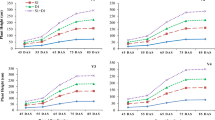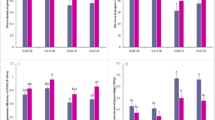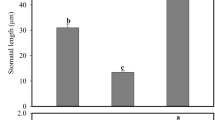Abstract
Audus and Quastel1 have recently shown that sodium thiosulphate is toxic to seeds of higher plants, and it has been reported2 that sodium ethyl xanthate is being used commercially as a weed-killer. The accompanying table shows the results of tests for toxicity to wheat seeds of a number of sulphydryl compounds, and may therefore be of interest.
This is a preview of subscription content, access via your institution
Access options
Subscribe to this journal
Receive 51 print issues and online access
$199.00 per year
only $3.90 per issue
Buy this article
- Purchase on SpringerLink
- Instant access to the full article PDF.
USD 39.95
Prices may be subject to local taxes which are calculated during checkout
Similar content being viewed by others
References
Audus, L. J., and Quastel, J. H., Nature, 160, 263 (1947).
Chem. and Eng. News, 26, 196 (1948).
Brian, P. W., Grove, J. F., and McGowan, J. C., Nature, 158, 876 (1946).
McGowan, J. C., Brian, P. W., and Hemming, H. G., Ann. App. Biol., 85, 25 (1948).
Grove, J. F., Ann. App. Biol. 85, 37 (1948).
Walsh, A. D., Quart. Rev. Chem. Soc. London, 2, (1), 73 (1948).
Author information
Authors and Affiliations
Rights and permissions
About this article
Cite this article
BRIAN, P., JAMIESON, M. & MCGOWAN, J. Toxicity of Sulphydryl Compounds to Seeds. Nature 162, 780 (1948). https://doi.org/10.1038/162780a0
Issue date:
DOI: https://doi.org/10.1038/162780a0
This article is cited by
-
Does a fluorinated Lewis acid catalyst change the molecular mechanism of the decomposition process of nitroethyl carboxylates?
Research on Chemical Intermediates (2018)



